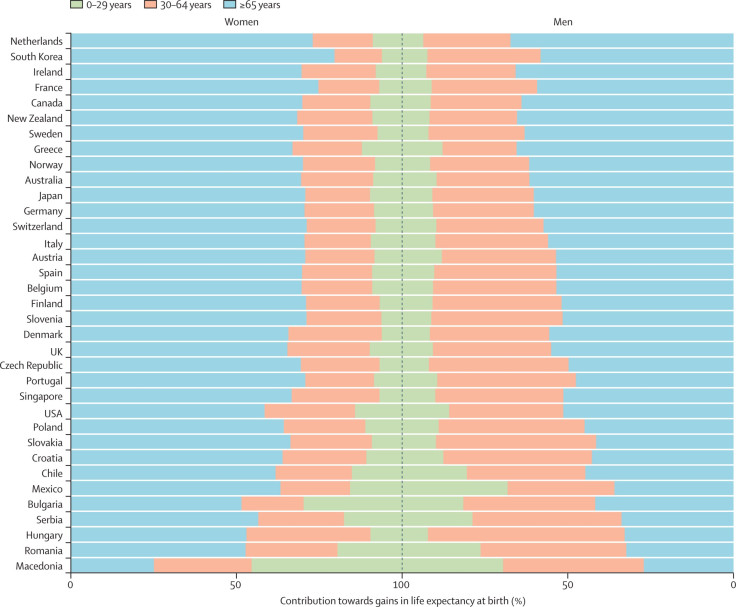Longevity Ranked By Country: How Long Should You Expect To Live?

What country should you live in if you want to live forever? None, but South Korea will be your best shot.
A new study from The Lancet predicts life expectancies in 35 countries through 2030, saying that men and women are likely to live longer in all of them. In these industrialized, high-income countries, “except in periods of war, famine and infection outbreaks, national life expectancy has increased steadily for decades.” To determine how old their populations are likely to become, the researchers took the average out of 21 different methods of measuring and predicting life expectancy.
South Korea is projected to see the largest increase in longevity out of all the countries analyzed — boys born in 2030 are likely to reach 84.1 years, while the girls could reach almost 91 years, according to the data. Women who are 65 years old in that year might be able to live another 27.5 years, and their male counterparts might get another 22 years of life. Some things that may influence those ages are better nutrition, health care and lifestyle choices.
Read: Can Cryogenic Freezing Help You Live Forever?
That Asian country is closely trailed by different nations depending on the category, but France, Japan, Spain and Switzerland are rounding out the top five behind it when it comes to the female groups. The women have the highest projected ages of the sexes, which is not surprising because females have consistently had longer life expectancies than men. “The current gender differences in life expectancy are due to differences in deaths from external causes (injuries) and from conditions such as lung cancer and cardiovascular diseases, whose risk factors (e.g., smoking) have different trends in men and women,” according to the study, but the gap is closing in many countries.
At the bottom of the list were a couple of countries that might be unexpected: The United States, Japan, Sweden, Greece, Macedonia and Serbia are all predicted to have the smallest gains in life expectancy. In the case of the U.S., the researchers note the country’s homicide rate, obesity levels, and lack of universal health coverage: “Therefore, the poor recent and projected U.S. performance is at least partly due to high and inequitable mortality from chronic diseases and violence, and insufficient and inequitable health care.”
All of these predictions, however, do not account for “unexpected events and changes in the social, technological, and health systems determinants of health,” a limitation of the study, according to its authors. Still, the data are relevant because “projections of future mortality and life expectancy are needed to plan for health and social services and pensions.”
The analysis is breaking through what has traditionally been seen as the ceiling of longevity.
“We repeatedly hear that improvements in human longevity are about to come to an end,” Majid Ezzati, lead researcher from Imperial College London, said in a statement from that institution. “Many people used to believe that 90 years is the upper limit for life expectancy, but this research suggests we will break the 90-year-barrier. I don’t believe we’re anywhere near the upper limit of life expectancy — if there even is one.”
Source: Kontis V, Bennett JE, Mathers CD, Li G, Foreman K and Ezzati M. Future life expectancy in 35 industrialised countries: projections with a Bayesian model ensemble. The Lancet. 2017.
See also:
Friends Keep Us Alive Better Than Our Families And Kids



























